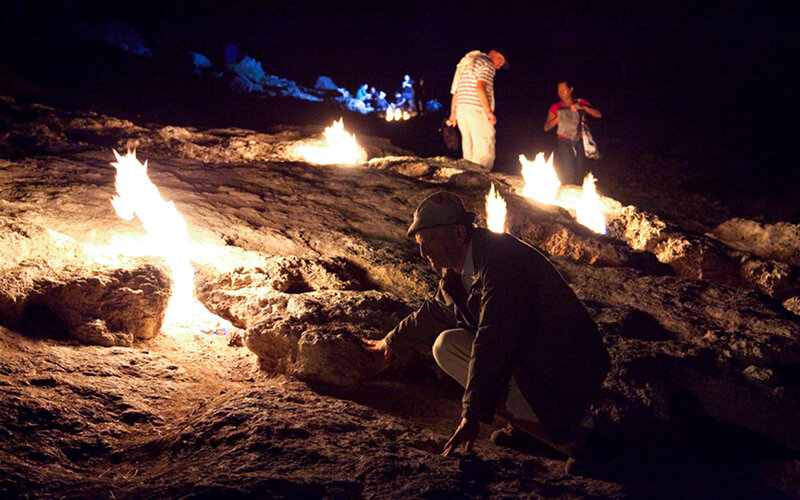THE BURNING MOUNTAIN – CHIMAERA
/
“…indeed burned with a flame that does not die by day or night. “
Pliny
FIRE, WATER AND MYTHOLOGY NEAR ANTALYA/TURKEY
The Chimaera is a bunch of small flames burning naturally on the rocky slopes of Mt Olympos, known as Yanartaş, or 'Burning Rock' in Turkish. Certainly, a flame that does not die by day or night is burned.
What's the name?
chimera-bellerophon
Well, this depends on who you're wondering! The name comes from a village in Greece. Of course, being Greek, they used the Greek alphabet and pronounced it ελλμππις. Typically, English speakers spell it as Olympos, but the Turks spell it as Olimpos. As commonly seen in the English text, this is like the spelling discrepancy between Istanbul and İstanbul, as it's actually spelled. Or Cappadocia versus Kapadokya.
It's very easy to see why ancient people attributed these extraordinary flames to the breath of a beast that terrorized Lycia, part lion, part goat and part snake.
By riding the winged horse Pegasus and pouring molten lead into the monster's mouth, the legendary hero Bellerophon allegedly destroyed the Chimaera.
Prometheus' Crime
According to Mark Cartwright, “Feeling sorry for man’s weak and naked state, Prometheus raided the workshop of Hephaistos and Athena on Mt. Olympus and stole fire, and by hiding it in a hollow fennel-stalk, he gave the valuable gift to man which would help him in life’s struggle. The Titan also taught man how to use their gift and so the skill of metalwork began; he also came to be associated with science and culture.
“PROMETHEUS RAIDED THE WORKSHOP OF HEPHAISTOS AND ATHENA ON MT. OLYMPUS AND STOLE FIRE; HE THEN GAVE THE VALUABLE GIFT TO MANKIND.”
In a slightly different version of the story, mankind already had a fire, and when Prometheus tried to trick Zeus into eating bones and fat instead of the best meat during a meal at Mt. Olympus, Zeus, in anger, took away fire so that man would have to eat his meat raw. Prometheus then stole the fire as in the alternative version. This also explained why, in animal sacrifices, the Greeks always dedicated the bones and fat to the gods and ate the meat themselves.” (Cartwright, 2013)
Today?
cirali-yanartas
Gas still seeps from the earth today and, upon contact with the air, explodes into flames. The exact composition of the gas is uncertain, but methane is assumed to contain it. Even by covering it, a flame may be extinguished; it will reignite into a new and different flame close by. The 20 or 30 flames in the main area are evident at sea at night.
Adventure?
If you like adventure tour, visit southeast of Turkey and visit Ancient Olympos and the Chimaera, especially after dinner is an amazing time to visit; follow the Chimaera signs for 3.5 km from Çıralı on the main road along the hillside before you enter a valley and walk up to a parking lot. It's a further 20- to 30-minute climb up a stepped path to the site from there; carry a torch (flashlight) or rent one From Olympos, most camps arrange transportation after dinner every night. (Cromwell, 2016)
At Cirali, marshmallows can be purchased and then roasted over the flames.
PRACTICAL INFORMATION
You will probably need some information to minimize the wasting time in order to enjoy your trip.
Get to Antalya by bus.
Ask for the minibus to the Antalya Otogar (Bus station), Olympos.
Every 30 to 60 minutes, they depart, and it takes about 90 minutes. Allow enough time before dark to reach Olympos.
The minibus will drop you off at a tea-house on the roadside. Well, a tea-tent actually.
Get some tea or something else to drink at the tea house and wait for a shuttle van from the valley if you arrive early enough.
If you arrive too late and the shuttle van is no longer running, then you can hire someone at the tea-house to drive you down to the valley when enough people gather.
Do not attempt to walk out of the tea-house! It's a couple of miles down a steep and winding path.
Source:
Cromwell-int, Turkey, 2016, retrieved from https://cromwell-intl.com/travel/turkey/olimpos/
Cartwright, Mark, Prometheus, 2013, retrieved from https://www.ancient.eu/Prometheus/
Serif Aydin
Serif Aydin is a student at Algonquin College. He is an editor-in-chief of a Turkish literary magazine and an activist.
twitter: @serifcanada
Instagram: @serifcanada





